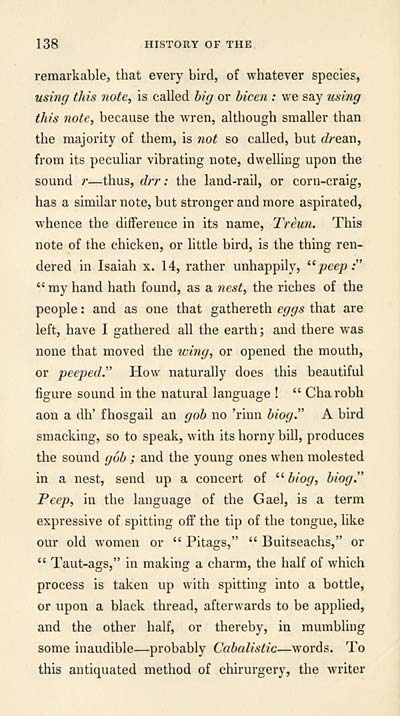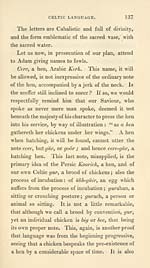Download files
Complete book:
Individual page:
Thumbnail gallery: Grid view | List view

138 HISTORY OF THE
remarkable, that every bird, of whatever species,
using this note, is called big or bicen : we say using
this note, because the wren, although smaller than
the majority of them, is not so called, but dreaxi,
from its peculiar vibrating note, dwelling upon the
sound r — thus, drr : the land-rail, or corn-craig,
has a similar note, but stronger and more aspirated,
whence the difference in its name, Treun. This
note of the chicken, or little bird, is the thing ren-
dered in Isaiah x. 14, rather unhappily, "jL>ee/>:"
*'my hand hath found, as a nest, the riches of the
people : and as one that gathereth eggs that are
left, have I gathered all the earth ; and there was
none that moved the wing, or opened the mouth,
or peeped." How naturally does this beautiful
figure sound in the natural language ! " Charobh
aon a dh' f hosgail an gob no 'rinn biog." A bird
smacking, so to speak, with its horny bill, produces
the sound gob ; and the young ones when molested
in a nest, send up a concert of " biog, biog"
Peep, in the language of the Gael, is a term
expressive of spitting off the tip of the tongue, like
our old women or " Pitags," " Buitseachs," or
" Taut-ags," in making a charm, the half of which
process is taken up with spitting into a bottle,
or upon a black thread, afterwards to be applied,
and the other half, or thereby, in mumbling
some inaudible — probably Cabalistic — words. To
this antiquated method of chirurgery, the writer
remarkable, that every bird, of whatever species,
using this note, is called big or bicen : we say using
this note, because the wren, although smaller than
the majority of them, is not so called, but dreaxi,
from its peculiar vibrating note, dwelling upon the
sound r — thus, drr : the land-rail, or corn-craig,
has a similar note, but stronger and more aspirated,
whence the difference in its name, Treun. This
note of the chicken, or little bird, is the thing ren-
dered in Isaiah x. 14, rather unhappily, "jL>ee/>:"
*'my hand hath found, as a nest, the riches of the
people : and as one that gathereth eggs that are
left, have I gathered all the earth ; and there was
none that moved the wing, or opened the mouth,
or peeped." How naturally does this beautiful
figure sound in the natural language ! " Charobh
aon a dh' f hosgail an gob no 'rinn biog." A bird
smacking, so to speak, with its horny bill, produces
the sound gob ; and the young ones when molested
in a nest, send up a concert of " biog, biog"
Peep, in the language of the Gael, is a term
expressive of spitting off the tip of the tongue, like
our old women or " Pitags," " Buitseachs," or
" Taut-ags," in making a charm, the half of which
process is taken up with spitting into a bottle,
or upon a black thread, afterwards to be applied,
and the other half, or thereby, in mumbling
some inaudible — probably Cabalistic — words. To
this antiquated method of chirurgery, the writer
Set display mode to: Large image | Transcription
Images and transcriptions on this page, including medium image downloads, may be used under the Creative Commons Attribution 4.0 International Licence unless otherwise stated. ![]()
| Early Gaelic Book Collections > Blair Collection > History of the Celtic language > (144) |
|---|
| Permanent URL | https://digital.nls.uk/76180193 |
|---|
| Description | A selection of books from a collection of more than 500 titles, mostly on religious and literary topics. Also includes some material dealing with other Celtic languages and societies. Collection created towards the end of the 19th century by Lady Evelyn Stewart Murray. |
|---|
| Description | Selected items from five 'Special and Named Printed Collections'. Includes books in Gaelic and other Celtic languages, works about the Gaels, their languages, literature, culture and history. |
|---|

